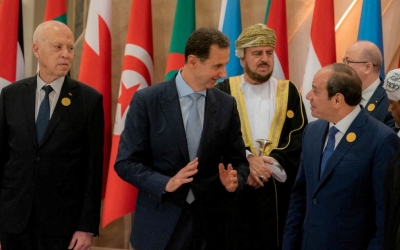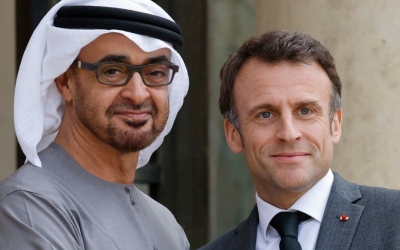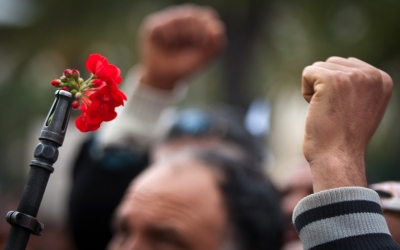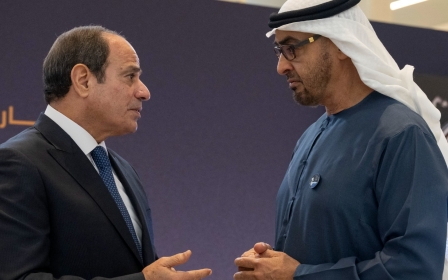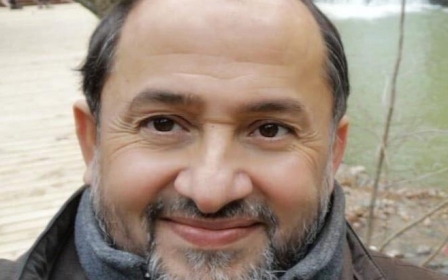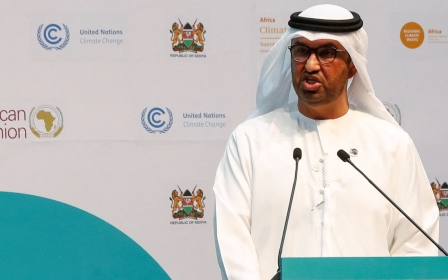The UAE's second largest political trial is underway. No one is sure who is being tried
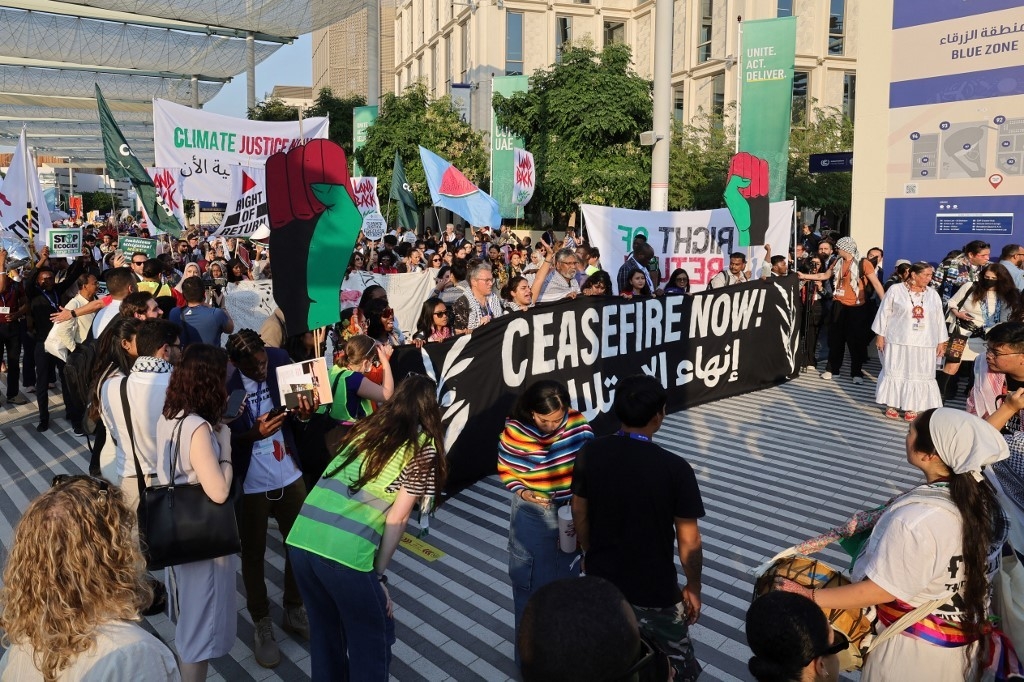
Nearly four months into what's believed to be the second largest political trial in the history of the United Arab Emirates, no one is sure exactly who is being tried.
Lawyers representing some of the 84 men refuse to share any details with their relatives, saying they signed agreements with authorities not to disclose any information.
And those who have been able to establish that their relatives are on trial have watched some proceedings on a muted screen from a separate room in the same courthouse, doors away from family members they haven't seen in months, if not longer.
"It is torture," a relative of one of the men on trial told Middle East Eye on condition of anonymity for fear of endangering their family.
"The government said the trial would be public and transparent, but there is nothing transparent about it... There are no names. There is no detail. There is nothing."
New MEE newsletter: Jerusalem Dispatch
Sign up to get the latest insights and analysis on Israel-Palestine, alongside Turkey Unpacked and other MEE newsletters
In early December, all eyes were on the UAE, which was hosting the Cop28 climate talks. As tens of thousands of delegates converged in Dubai's Expo City, about 100km away in Abu Dhabi's Federal Appeal Court, the 84 defendants had their first hearing.
Reports from the state-run WAM news agency allege that the men established and managed a terrorist organisation and laundered money to support their efforts.
Rights groups say it appears they were charged under the UAE's 2014 counterterrorism law, which has been criticised for enabling the conviction of peaceful government critics as terrorists.
Family members of the men say they are following the proceedings as best they can, but also see the trial as a sham and an act of collective punishment.
"There is something they are cooking about this trial which is clearly unjust and unfair," said the relative.
A decade on from the UAE94 trial
Most of the men are understood to be among those convicted a decade ago in the UAE's largest-ever mass trial, which was widely criticised by rights groups as grossly unfair.
Held at the height of the Arab uprisings, the trial saw 94 activists, lawyers, doctors and others, who had petitioned leaders to institute democratic reforms, accused of plotting to overthrow the government.
Many of the 94 were members of al-Islah, an Islamist association officially established in the UAE in the 1970s with encouragement, and even funding, by Emirati rulers at the time.
But by the early 1990s, the group had become a source of concern for some of the country's leaders who feared the influence of members within government ministries and the group's drift into political activities.
Those fears ratcheted up with the 2010-2011 Arab uprisings as several Islamist parties, including those with links to the Muslim Brotherhood from which Islah had drawn ideological inspiration, were elected to power in the region.
In 2012, as the 94 men were rounded up, officials and media reports alleged that the country's national security was under threat by a "foreign-linked group", alluding to the Brotherhood, and that arrested Islah members had confessed to forming a secret organisation.
But members of the group and their families denied the claims, saying the group shared ideological links to the Brotherhood, but not any direct ties and that any confessions were made under duress.
The UAE94 were found guilty, with most handed sentences of 10 years, meaning they were due to leave prison last year.
But they have remained behind bars, many placed in what are called munasaha (counseling) centres, ostensibly because they continue to pose a threat to society, but in actuality, rights groups say, as a way to hold onto critics and activists indefinitely.
Last June, as UN experts and rights groups called for their immediate release, families lost all contact with the men, Hamad Shamsi, executive director of the Emirates Detainees Advocacy Center (EDAC), told Middle East Eye.
"All of the detainees were fully disappeared," Shamsi said.
Six months later, as delegates hashed out an agreement over the transition from fossil fuels at Cop28, the men reappeared in the court in Abu Dhabi, defendants in the new trial.
Trial as deterrent?
While the majority of the men standing trial are believed to have been part of UAE94, why there are now 84 defendants is a topic of speculation.
Some believe those unaccounted for may have died or signed deals with the government to secure their release, but no one is sure.
UAE94 defendants now being tried include Sheikh Sultan bin Kayed Al-Qasimi, a senior member of the ruling family in Ras Al-Khaimah, human rights lawyers Mohammed al-Roken and Mohammed Al-Mansoori, and human rights defender Abdulsalam Mohamed Darwish al-Marzooqi.
'This is meant as a deterring reminder for people emboldened by the anti-Israel mood in the region. It's not about the prisoners. They are just theatrics'
- Mira al-Hussein, sociologist
Khalaf al-Romaithi, the Emirati businessman who vanished from Jordan where he was arrested on a warrant while travelling last May, only to surface a week later in the UAE, is also on trial. Romaithi was convicted in the UAE94 trial in absentia.
The group, however, also includes the economist and lecturer, Nasser bin Ghaith, and human rights defender Ahmed Mansoor who were not involved in the UAE94 case but were detained in connection to their human rights work.
WAM has reported that the the trial is "not a retrial", but rather a completely different case based on "a compelling body of evidence", including confessions, gathered through a nearly six-month investigation - the same amount of time the men were incommunicado with their families.
But rights groups say the men are being tried in connection with the same activities for which they were convicted in 2013 and for which they have already served sentences.
"The case is very weak. [The public prosecution] do not have anything. It's basically a retrial," said Shamsi, who is also a named defendant in the trial.
The key difference is that while authorities accused the men of being members of a secret organisation in 2013, they now describe their crime as terrorism-related, charges which carry potential life sentences or even the death penalty.
A Jordanian judge is presiding over the case. While foreign judges are not uncommon in Emirati courts, the EDAC has questioned why one is presiding over a national security case which deals with sensitive information.
So why now? Some have theorised that because the UN and rights groups were asking questions, the Emirati authorities have felt compelled to justify why the men are still in jail.
Mira al-Hussein, a Emirati sociologist and research fellow at the University of Edinburgh, said she thinks the real reason is the war on Gaza.
Hundreds of activists marched in a protest calling for a ceasefire on the sidelines of Cop28. This display, Hussein believes, worried leaders of the country which had normalised relations with Israel in 2020.
"We went to pre-normalisation levels of openness in criticising Israel and airing frustration," she said.
The rulers in the UAE were "never really interested in letting these people out ever" and feel no need to justify their actions. They are more focused on issues like Somalia and Socotra, and UAE and Saudi forces clashing in Yemen.
Instead, she thinks the trial is a warning to Emiratis. "This is meant as a deterring reminder for people who are emboldened by the general anti-Israel, anti-normalisation mood in the region. It's not about the prisoners. They are just theatrics in the background."
The nationality of the judge, she added, is a red herring. "Judges pass rulings. They don't necessarily make them," she said.
The UAE embassy in the UK did not respond to Middle East Eye's request for comment.
'A half-black screen with no sound'
While family members agree that the UAE84, the shorthand being used for the current trial, is essentially a replay of the UAE94 trial, they said the secrecy employed by authorities has gone much further this time.
"What happened in 2013 is exactly what is happening right now, but right now they are even better at engaging in oppression and injustice and unfair trials," Jenan al-Marzooqi, daughter of Abdulsalam Mohamed Darwish al-Marzooqi, told MEE.
"Everything is being repeated, but it's even worse."
A decade ago, she said, two family members would be allowed to attend hearings and sit in the courtroom where the trial was underway. Case files were available mid-way through.
'I'm living like I'm not going to see my father in this life. It's that bad'
- Relative of a UAE84 defendant
But this time, Marzooqi said her family has been left to piece together what is happening. They only knew for sure that her father was a defendant when someone happened to see him on the screen from the room where onlookers could sit to watch the trial.
During some hearings, the screen was muted. When observers asked for the sound to be fixed, she said they were told there wasn't anything wrong.
"That was the order they got: mute the TVs," she said. "You were just sitting there for five hours, looking at a half-black screen with no sound."
Witnesses for the prosecution and soldiers guarding the detainees have been masked during some hearings so those watching were unable to identify anyone.
An NGO contacted Marzooqi to give them permission to talk to her father's attorney about his case, which she gave. The lawyer was angry when he spoke to the organisation.
"He said: 'Tell Jenan to stop being active and to stop talking about the case because that will affect her father negatively'," she said. "I can't imagine a lawyer who studied law to say that someone's action will affect another person's case negatively. It just doesn't make sense, but it shows you how the entire system is corrupt."
The relative of one of the men on trial who spoke on condition of anonymity said his family members happened to meet his father's solicitor at the courthouse, but the solicitor has never contacted their family and they understand that he has never met with his father to go over the case.
When sound was eventually turned on the screen where relatives were watching the trial, he said they could hear the prisoners saying they had not met with solicitors.
"'We are not allowed to speak to them. We are not allowed to contact them'," he said the observers heard the men saying.
He pointed out that, by his count, more than 30 of the detainees are 60 years old or older and five are over 70. "The plan is just to have a reason to leave them in prison until they die," he has concluded.
"It is devastating, but I've been living with this situation for 12 years. Now I'm living like I'm not going to see my father in this life. It's that bad. Especially with the new trial, I will not see him in this life."
The next hearing of the trial is expected to be held on Thursday.
This article is available in French on Middle East Eye French edition.
Middle East Eye delivers independent and unrivalled coverage and analysis of the Middle East, North Africa and beyond. To learn more about republishing this content and the associated fees, please fill out this form. More about MEE can be found here.


